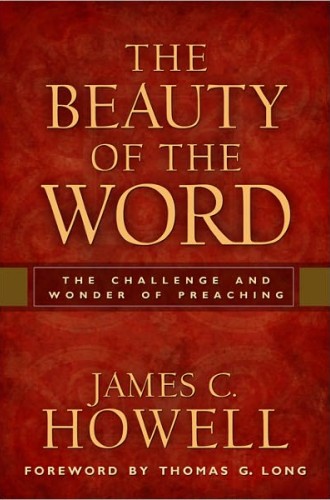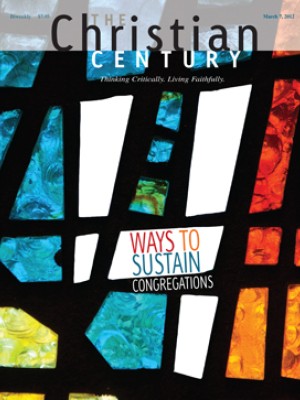Inspired preachers
The worst sermon I ever preached had its roots in shame and iniquity. And the worst part is that I knew it was going to be a terrible sermon before I preached it.
It was one of those dry weeks when I couldn't come up with a thing to say, and the lectionary texts weren't helping. I didn't have time to study them before the church secretary needed a sermon title for the big sign outside our church.
It was going to be a holiday weekend, and I was already irritated. I was angry at all those slackers who would skip the terrible sermon I had not yet put any work into. What could I possibly put on the sign outside the church that might entice someone who was thinking of skipping church to come in? And what topic was vague enough to cover whatever the muse might give me in the days ahead? Then it hit me, in a moment of marketing genius: "Thank God for Grandmothers." Who could resist that?
That Sunday I told a story about my sweet paternal grandmother who made waffles for me, and I think I tied it to something Jesus said or did, but tie may be too strong a word. It would be more accurate to say that the sentimental grandmother musings were the main dish I was serving that day—and Jesus was on the side, like a condiment. Sure enough, there were people who told me they had made a special point of coming to church that day, a few even with dear Grandma in tow. But to this day, I imagine all the sweet grannies in heaven shaking their heads during my ramblings and saying, "Well, it wasn't your best, dear."
Read our latest issue or browse back issues.
I confess this because I have a hunch I am not the only preacher with something like "Thank God for Grandmothers" on the shelf of shame. But I also confess it because I want to hold myself to a higher standard. I want to preach each week with the passion the calling deserves, and sometimes I need a little inspiration to get me there. That inspiration has come from a book by James C. Howell.
Howell, the senior pastor of Myers Park United Methodist Church in Charlotte, North Carolina, has a very high view of the preaching task. "Do not write one more word of one more sermon until you have found something big and true to say," he states with refreshing boldness. "Do not stand in a pulpit ever again unless you intend to speak of what is large, the fruit of good seeing and good thinking, and with some urgency."
But Howell also writes like someone who has knows about those "Thank God for Grandmothers" low points in the preaching life. This is the book's strength. Light on theory and heavy on practicality, The Beauty of the Word was obviously written by a working pastor. It is a preaching book that both tells it like it is and asks us to strive for more.
You can't help seeing yourself as the preacher in Howell's down-to-earth descriptions. Here he tells of that awful sensation of preaching a sermon that seems to be falling flat:
Mid-sermon, you begin to feel the reviews. You try eye contact, but the first guy you engage has a blank gaze, politely pointed in your direction. Or a puzzled look indicates that the logic you so relished just last night is eluding them. They're shuffling in their seats . . . and there is the fourth or fifth person who can't wait five more minutes to go to the bathroom. What is she hunting in her purse? And that guy in row seven who has nodded off is just about to bang his head on the pew in front of him. You realize mid-sermon that it just isn't working.
What preacher has not had that agonizing experience? (The only advice I can recall on this is from the orator who advised writing in one's margins, "Point weak—shout louder here!") But Howell does more than commiserate. He digs into the Christian preaching tradition and shows how Luther, Calvin and John Chrysostom (also known as "golden mouth") coped with failure to ignite the crowd.
Howell's section on feedback should be required reading for every new preacher; it was also a helpful reminder to me as an experienced preacher who longs for more feedback from my parishioners. Howell wisely takes us through the awkwardness that parishioners feel when, after they have said that a sermon touched them, the preacher is hungry for more and asks what exactly made the difference. The poor listener stumbles, unable to answer. Howell points out that when preachers press parishioners for more, it is as if the listeners are being asked to come up with a comment after a symphony, to say something specific like "Gosh, when the oboe hit that F-sharp I was stunned." Sermons usher us into the presence of God, he reminds us, and preachers are wrong to expect listeners to deliver a thoughtful critique about how exactly they were touched.
In one delightful section that could only come from a southerner, Howell reflects on the target of the sermon, asking: Is it for you or for me?
Confronting the individualism of American faith, Howell suggests that the answer is neither you nor me, but that the sermon is for "y'all." "The future, the hope God gives 'you' (y'all) is for a crowd, for the community, for the nation," he explains. "The text works by declaring to the Body that God has plans for y'all, . . . a far better adventure than some mere solo adventure with the Divine." That straightforward gem from a southern preacher will work for me in the Midwest.
Howell's short section on how to manage occasions like July 4 and Mother's Day are worth the price of the book. They won't please the purists, but they gave me comfort as I navigate the sentimental tendencies of the suburbs, hoping I don't have to lose my soul.
I always approach books about preaching with a certain amount of anxiety because I know they will get me worked up. If I disagree with the author, I become passionately upset because the stakes of preaching are so high. If I agree with the author, I get passionately upset that my own preaching is not good enough. And if the author challenges me, I get passionately upset that my own preaching will never meet the challenge. The Beauty of the Word falls in the third category, but it didn't leave me paralyzed.
Howell may shame us, but he doesn't talk down to us. He asks us to hold one another to a higher standard but to forgive ourselves for missing the mark: "In a way this book is about failure in preaching, although I would defend homiletical failure as the only genuine sacrifice of words on the altar of God's church."
Now I have a sermon to write this week, as do so many readers of this review. It's been a pretty long week around First Congregational Church, and I'm low on inspiration. What goes on the sign outside of the church? A small part of me is leaning toward "Thank God for Puppies." But the better part of me just read The Beauty of the Word, and that part of me wants to do better.







